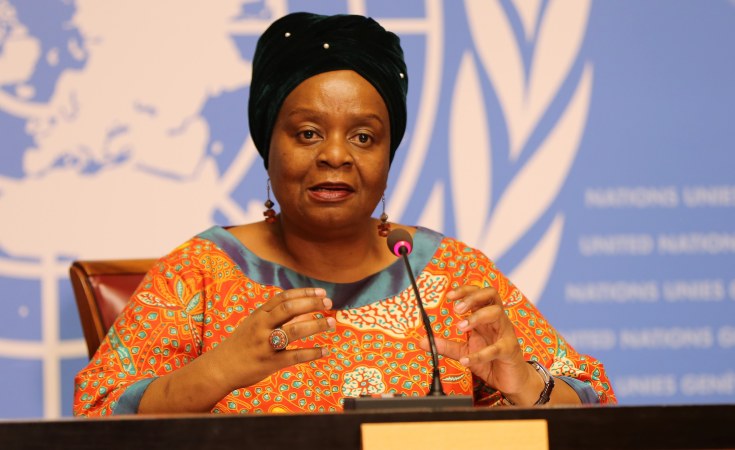Geneva — COVID-19 is having a profound impact on global trade and the businesses that drive it, says a new report by the International Trade Center (ITC). The report highlights the devastating effect the pandemic is having on the small and medium enterprises so important to Africa's economies.
The SME (small and medium-sized enterprises) Competitiveness Outlook predicts that African exporters are set to lose more than $2.4 billion in global industrial supply-chain exports. The expected losses are a result of factory shutdowns in China, the European Union and the United States.
The 2020 edition of the ITC's 2020 Outlook reveals just how profoundly SMEs and global supply chains have been tested by the COVID-19 pandemic, leaving international trade in turmoil.
The report also highlights the importance of the African Continental Free Trade Area (AfCFTA) in any recovery.
ITC acting Executive Director Dorothy Tembo of Zambia said: ‘The COVID-19 pandemic has been both a health and an economic crisis and has presented a number of challenges for SMEs and global supply chains.”
Supply chain linkages
The bulk of the African export losses – more than 70 percent – is caused by the temporary disruption of supply-chain linkages with the EU, the report released on June 22 showed.
While most countries experienced some form of shutdown, the findings in the SME Competitiveness Outlook highlight that it was lockdowns in China, the European Union and the United States that have had the most significant impact on trade.
Together these three economies account for 63 percent of world supply-chain imports and 64 percent of supply-chain exports. The report estimates that the global disruption of these manufacturing hubs will amount to $126 billion in 2020.
With countries in various stages of lockdown or loosening confinement periods, it is becoming clear that the virus has particularly impacted SMEs.
Although the pandemic has affected every corner of the world, the economic earthquake unleashed by COVID-19 does not affect everyone in the same way.
With fewer resources to ride out the storm, micro, small and medium enterprise (MSMEs) have been particularly vulnerable to the repercussions of the crisis.
These firms in developing countries will be disproportionately affected, especially in Africa, least developed countries and small island developing states.
Small businesses active in trade tend to be more competitive and resilient. Yet many of them have been shaken by severe disruptions in international supply chains.
Health and economic crisis
Tembo added: “The COVID-19 pandemic has been both a health and an economic crisis and has presented several challenges for SMEs and global supply chains.
“ ITC’s 2020... Outlook report analyses the impact of COVID-19 on SMEs, international supply chains and trade while highlighting actions to build the resilience of SMEs, given that they will continue to be lightning rods for future growth and to meet the Sustainable Global Goals.
“ So when we look at the totality of the enterprises we have, including the multinationals, we still have 90 percent by small and medium enterprises. That is why they remain very critical in this particular context.
“ In the context of any COVID recovery, we would still have to address ourselves to supporting small and medium enterprises if we want to have a holistic response that enables us to move in a better direction.”
Marion Jansen, the ITC chief economist, added, “Keep in mind that small and medium-sized enterprises around the globe are responsible for more or less 70 percent of jobs.”
The report also includes a contribution from Wamkele Mene, the newly appointed Secretary-General of the African Continental Free Trade Area secretariat, who sets out a new model for economic growth in Africa in a post-pandemic world.
He notes that more than ever, the creation of a single continental market will be a game-changer for Africa.
AfCFTA
“ For... AfCFTA and other multilateral bodies, mitigating the effects of the pandemic is not only the priority for today. It is also vital to salvage past gains and to maintain carefully laid plans for the future.
“ The AfCFTA is a far-reaching initiative, designed to foster industrial development and ensure Africa’s prosperity. To this end, it seeks to create an institutional ecosystem to address the continent’s marginal role in global value chains, its structural trade imbalance and its over-reliance on bumpy commodity markets – namely, mineral resources and fossil fuels.”
Mene says that micro, small and medium-sized enterprises (MSMEs) play a crucial role in Africa’s economy.
“ Their importance became even more pronounced as the global downturn wreaked havoc on the export-led travel, hospitality and extractive industries – sectors dominated by big companies.
“ Providing MSMEs with an ecosystem that nurtures investment and opening borders for their development is a precondition for postcoronavirus recovery – and beyond, it is a foundation for resilient economic and social development,” he wrote.


